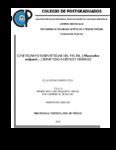Cinéticas fotosintéticas del frijol (Phaseolus vulgaris L) sometido a déficit hídrico
Abstract
Los factores abióticos afectan las funciones de las plantas, así como su eficiencia para absorber el CO2 y transformar la radiación fotosintéticamente activa (RFA) durante el proceso fotosintético. Aquí se estudió el efecto del déficit hídrico durante inicio de floración en tres características fotosintéticas del frijol (Phaseolus vulgaris L.): punto de compensación (PC) y de saturación (Psat) en respuesta a CO2 y luz, y la eficiencia de Rubisco (ER). Se midió la cinética de la respuesta a los aumentos del CO2 intracelular (Ci) y externo (Co), y la radiación fotosintéticamente activa (RFA). Se establecieron dos experimentos, Fase I y II, en los que se evaluaron tres variedades de frijol con hábito de crecimiento III en dos niveles de humedad edáfica. En la Fase I los tratamientos evaluados resultaron de la combinación de dos variedades (ʻPinto Saltilloʹ -PS- considerada resistente a sequía; y ʻBayo Maderoʹ -BM- considerada susceptible), con dos niveles de humedad edáfica (sin riego por 12 d, en que la humedad fue menor que el PMP, y el testigo con riego); las plantas se cultivaron a cielo abierto en Chapingo, Estado de México, en bolsas con 5 kg de suelo. En la Fase II la siembra se llevó a cabo en invernadero, y los tratamientos evaluados correspondieron a la combinación de dos variedades (ʻBayo Maderoʹ -BM- y ʻPinto Villaʹ -PV-, esta ultima considerada resistente a la sequía), con dos niveles de humedad edáfica (sin riego por 8 d y el testigo con riego); en este caso la siembra se realizó en macetas con capacidad de 6 kg de suelo. En condiciones de déficit hídrico las tres variedades disminuyeron su Amax y la ER, sobre todo en BM. Con el riego de recuperación, las tres variedades recobraron plenamente sus parámetros fotosintéticos Psat y PC. El estrés hídrico de 8 d (Fase II) no afectó la distribución de biomasa final ni el rendimiento de grano de la var. BM aunque deshidrató al suelo por abajo del PMP; la variedad PV tampoco fue afectada en su distribución de biomasa y rendimiento de grano, pero disponía de agua aprovechable en el suelo durante la sequía, por lo que puede considerarse más eficiente en el uso del agua. _______________ KINETICS OF PHOTOSYNTHESIS IN BEAN (Phaseolus vulgaris L.) UNDER WATER DEFICIT. ABSTRACT: Abiotic factors affect the physiological processes of plants and their efficiency to absorb CO2 and convert photosynthetic active radiation (PAR) during photosynthesis. We studied the effect of water stress on common bean (Phaseolus vulgaris L.) during flowering, on three photosynthetic parameters: compensation point (CP) and saturation point (Psat) in response to CO2 and light, and Rubisco efficiency (RE). The photosynthetic responses to increases in intracellular CO2 (Ci) and external (Co) or in photosynthetic active radiation (PAR) were measured. Two experiments were established, Phases I and II included three bean varieties with growth type III in two levels of soil moisture. In Phase I, uncovered plants were grown in 5 kg-soil pots at Chapingo, State of México, and the treatments evaluated resulted from the combination of two varieties (‘Pinto Saltillo’ –PS- considered drought tolerant, and ‘Bayo Madero’ -BM- considered susceptible), with two levels of soil moisture (without irrigation for 12 d, in which soil moisture decreased below PWP, and the irrigated control). In Phase II planting was done under greenhouse conditions, where the treatments corresponded to the combination of two varieties (‘Bayo Madero’ -BM- and ‘Pinto Villa’ -PV-, the latter considered drought tolerant), with two soil moisture levels (without watering for 8 d, and the irrigated control); in this case, plants were grown in pots with 6 kg of soil. Under drought stress conditions both Amax and ER decreased in the three varieties, and to a higher degree in BM. After irrigation was resumed, the three varieties fully recovered their photosynthetic parameters Psat and PC. The 8 d water deficit (Phase II) did not affect final biomass distribution and grain yield of varieties BM and PV, even though the BM plants depleted the soil moisture below the PWP; however, PV still had available soil water at the end of the stress period, thus indicating that this variety has higher water use efficiency.
Collections
- Tesis MC, MT, MP y DC [131]


